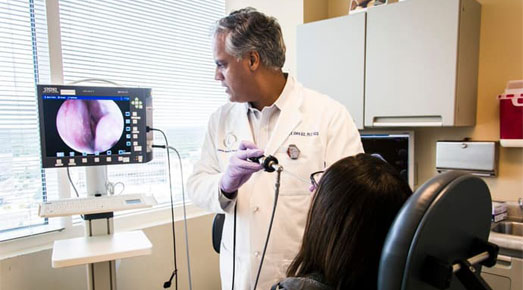ALLERGY TESTING

Allergy tests are used to determine the specific substances that cause an allergic reaction in an individual. They may also be used to determine if a group of symptoms is a true allergic reaction (involving antibodies and histamine release). Some food intolerances, in which there is an inability to digest a food because of lack of appropriate enzymes, mimic allergies. Certain drugs, such as aspirin, can cause allergy-like symptoms, but without the formation of antibodies or the release of histamine.
Between 40 – 50 million people in the United States suffer from asthma or allergies. These illnesses are so common that it might seem that any doctor should be able to administer effective therapies. However, an allergist is an expert in the allergy field with training that allows them to perform allergy testing, accurately diagnosis and develop a personalized treatment plan that is right for you and provide you with the most cost-effective treatment that produces the best results.
At the AI4ENT, the two key steps in the process of your allergy diagnosis is taking your accurate medical history and allergy test selection. When it comes to providing our patients with the most comprehensive, accurate treatment of their allergic disease, getting an accurate medical history is as important as the results of the allergy test. An accurate medical history is the critical link between the allergy test results and the allergic disease itself.
During your consultation at the AI4ENT, Dr. Pradeep Sinha will:
- Take your medical history. You will be asked about your health, and whether other members of your family have asthma or allergies.
- Ask you about your symptoms. Dr. Sinha will want to know when symptoms occur, how often they happen, and what seems to bring them on. He will also ask about your work, home, and eating habits to see if these can provide clues to help pinpoint your allergy.
- Do a physical exam.
- Conduct allergy tests.

HOW IS ALLERGY TESTING DONE?
Allergy testing can be done as skin tests or as blood tests. Allergy testing should always be performed under the guidance of an allergy specialist, such as Dr. Sinha.
TYPES OF ALLERGY TESTING
Skin Tests
Allergy skin testing is the gold standard and is used along with the medical history to establish a diagnosis, but board-certified allergists, such as Dr. Pradeep Sinha, recognize that not all allergy tests are alike. At the AI4ENT our doctors regularly review the scientific literature to learn which testing systems work better than others and the laboratory practices that may affect test results. It is also important for our patients to know that allergy tests should not be ordered randomly, but based on the patient’s individual symptoms, environmental and occupational exposures, age, and even hobbies, and all of the results receive are then then interpreted in the context of the patient’s medical history.
Skin tests give fast results. They usually cost less than allergy blood tests. What are the negatives? Some medicines can interfere with the tests. Skin tests can be performed for common allergens such as plant pollens, molds, dust mites, animal dander, insect stings and various foods such as peanuts, eggs, wheat, shellfish and milk. Testing is also available for some medicines, such as penicillin. There are two types of skin tests:
- The prick test pricks the surface of the skin with a tiny amount of the allergen. The test is done on your back or the inside of your arms with several allergens tested at once. If you’re allergic, redness and swelling appear at the site of the prick.
- The intradermal test injects the allergen with a very fine needle under the first few layers of the skin. This type of skin test may be used when the result of a prick test is not clear.
Allergy Blood Tests
Radioallergosorbent (RAST) testing is a blood test that detects specific antibodies to determine what substances a patient may be allergic to. In certain circumstances a patient may not be able to undergo traditional skin testing, and a RAST test would be performed instead. RAST testing is helpful because it involves a single needle prick, and medicine does not interfere with the results.
However, it can take several days to get the results, and depending on the test, there can be false positives. Additionally, blood tests cost more than skin tests, and there are many of types of allergy blood tests. Some types are more helpful than others.
While skin tests are more sensitive than blood tests, Dr. Sinha might use a blood test to diagnose allergies if:
- You’re taking a medicine that could interfere with allergy test results.
- You have very sensitive skin or a serious skin condition.
- You had a previous reaction to an allergen that suggested you were very sensitive and should avoid more exposure.
After drawing blood, the sample will be sent to a lab to look for the antibodies of specific allergens that show if you have allergies. It takes a few days to receive blood test results. No matter what type of allergy test is given, Dr. Sinha is an expert at selecting which allergens should be tested, reviewing the results, and helping you find the right treatment for relief.
Both blood and skin allergy tests can detect a patient’s sensitivity to common inhalants like pollen and dust mites or to medicines, certain foods, latex, venom, or other substances.

WHAT HAPPENS IF THE SKIN TEST SHOWS I HAVE ALLERGIES?
Dr. Sinha will create a plan for controlling your allergies. This means preventing and treating symptoms. Take these steps:
- Avoid or limit contact with your allergens.
- Take medicines that have been prescribed for you to relieve your symptoms.
- Get allergy shots if medically ordered to do so. Some people need them when they can’t avoid an allergen.
DOES HEALTH INSURANCE COVER SKIN TESTING FOR ALLERGIES?
Most health insurance plans cover allergy testing and treatment. Ask your insurance carrier:
- Do I need a referral from my doctor to see an allergist?
- Does my insurance cover patient education or special services for my allergies?
- What allergy testing and medicines does my plan cover?
At the AI4ENT, board-certified specialists are trained to help you take control of your allergies and asthma, so you can live the life you want. We understand the ins and outs of allergy testing and oversee what happens during and after test sample analysis. Our skills are important because there are many variables that affect allergy test results, and if these nuances are missed or wrongly interpreted by physicians who do not specialize in allergies and asthma, you may not get the best treatment to relieve your symptoms. Contact the AI4ENT today to schedule your allergy consultation.
